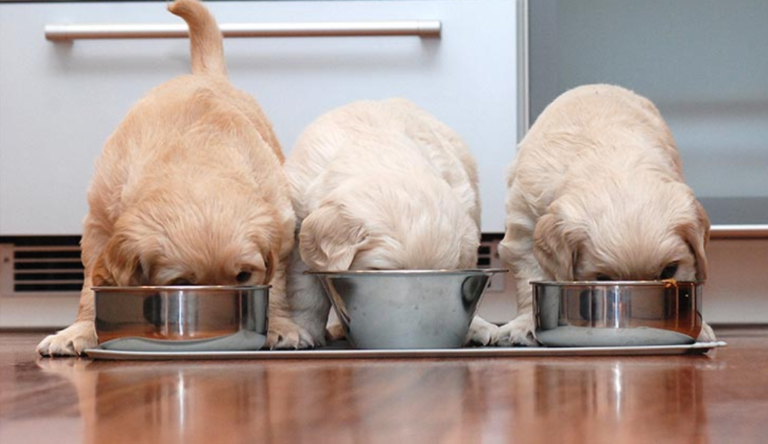Proper nutrition is one of the most crucial aspects of raising a healthy, happy puppy. In this comprehensive guide, you’ll discover the essential elements of puppy nutrition, learn how to select the right food for your furry friend’s specific needs and understand the importance of proper feeding schedules. Mastering these fundamentals ensures your puppy receives the optimal nutrition for a vibrant, active life.
Why Proper Puppy Nutrition is Crucial
Proper nutrition is the cornerstone of your puppy’s health and development. Whether you’re considering Mini Goldendoodles for your family or have already welcomed one into your home, understanding the importance of a balanced diet is essential.
Fueling Growth and Development
Puppies grow at an astonishing rate, and their nutritional needs are vastly different from those of adult dogs. A well-balanced diet supports:
- Bone and muscle development
- Cognitive function
- Immune system strength
Puppies may face stunted growth, weakened immune systems, and potential long-term health issues without proper nutrition.
Establishing Healthy Habits
The eating patterns you establish during puppyhood can impact your dog’s health for years. You’re setting the foundation for a lifetime of good health by providing nutritious meals and maintaining a consistent feeding schedule.
Breed-Specific Considerations
Different breeds have unique nutritional requirements. Mini Goldendoodles, for example, may need a diet tailored to their size and energy levels. Consulting with a veterinarian can help you determine your puppy’s best nutritional plan.
Remember, investing in high-quality nutrition now can prevent health problems and veterinary expenses down the road. By prioritizing your puppy’s diet, you’re ensuring they have the best possible start in life and setting them up for a healthy, happy future as a cherished family member.
How Often and How Much to Feed Your Puppy
Establishing a Feeding Schedule
When it comes to feeding your puppy, consistency is key. Establish a regular feeding schedule to help regulate your puppy’s digestion and energy levels. Aim for three to four small meals per day for young puppies. As your puppy grows, you can gradually transition to two meals daily, typically around six months.
Portion Control
Determining the right portion size for your puppy depends on factors such as breed, age, and activity level. Consult your veterinarian or follow the feeding guidelines on your puppy food packaging as a starting point. Remember, these are general recommendations, and you may need to adjust based on your puppy’s needs.
Monitoring Growth and Adjusting Intake
Regularly monitor your puppy’s weight and body condition to ensure they grow healthy. If you notice your puppy becoming overweight or underweight, adjust their portion sizes accordingly. It’s important to avoid overfeeding, as excess weight can lead to health issues later in life. On the other hand, underfeeding can stunt growth and development. Finding the right balance is crucial for your puppy’s long-term health and well-being.
Recommended Puppy Food Types (e.g., dry, wet, raw)
Dry Kibble: The Popular Choice
Dry kibble is often the go-to option for many puppy owners, including those with Mini Goldendoodles for your family. It’s convenient, cost-effective, and helps maintain dental health. Look for high-quality, puppy-specific formulas that meet AAFCO standards for growth. These typically contain a balanced mix of proteins, fats, and carbohydrates essential for your puppy’s development.
Wet Food: A Tasty Alternative
Wet or canned food can be an excellent choice for picky eaters or puppies needing extra hydration. It’s often more palatable and can be easier to digest. However, it’s generally more expensive and doesn’t provide the same dental benefits as kibble.
Raw Diets: A Controversial Option
Raw diets, consisting of uncooked meats, bones, and vegetables, have gained popularity in recent years. Proponents claim benefits like improved coat quality and energy levels. However, these diets require careful planning to ensure nutritional balance and pose risks of bacterial contamination. Always consult with your veterinarian before considering a raw diet for your puppy.
Remember, every dog is unique. Monitor your pet’s weight, energy levels, and stool consistency during and after the transition. If you notice any concerns, don’t hesitate to consult your veterinarian for personalized advice.
Conclusion
As you embark on your journey of puppy parenthood, remember that proper nutrition is the foundation for your furry friend’s lifelong health and happiness. Consult your veterinarian regularly to adjust your puppy’s diet and address concerns. With the right approach to nutrition, you’ll be rewarded with a vibrant, healthy companion for years to come. Committing to your puppy’s well-being starts with every meal, so make each bite count towards a bright and energetic future together.





